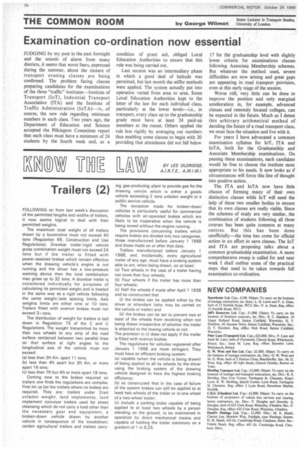Examination co-ordination now essential
Page 78

If you've noticed an error in this article please click here to report it so we can fix it.
JUDGING by my post in the past fortnight and the sounds of alarm from many districts, it seems that worst fears, expressed during the summer, about the closure of transport evening classes are being confirmed. The problem facing classes preparing candidates for the examinations of the three "traffic" institutes—Institute of Transport (IoT), Industrial Transport Association (ITA) and the Institute of Traffic Administration (IoTA)—is, of course, the new rule regarding minimum numbers in each class. Two years ago, the Department of Education and Science accepted the Pilkington Committee report that each class must have a minimum of 24 students by the fourth week and, as a condition of grant aid, obliged Local Education Authorities to ensure that this rule was being carried out.
Last session was an intermediary phase in which a good deal of latitude was permitted, but last month the stiffer methods were applied. The system actually put into operation varied from area to area. Some Local Education Authorities kept to the letter of the law for each individual class, particularly at the lower levels—i.e., in transport, every class up to the graduateship grade must have at least 24 paid-up members at the outset. Others applied the rule less rigidly by averaging out numbers thus enabling some classes to begin with 20 providing that attendance did not fall below 17 for the graduateship level with slightly lower criteria for examinations classes following Associate Membership schemes. But whatever the method used, severe difficulties are now arising and great gaps are appearing in road transport provision, even at this early stage of the session.
Worse still, very little can be done to improve the position and only marginal amelioration in, for example, advanced classes and remotely located colleges, can be expected in the future. Much as I detest this arbitrary arithmetical method of deciding the future of a road transport class, we must face the situation and live with it.
For years I have advocated a common examination syllabus for IoT, ITA and IoTA, both for the Graduateship and Associate Membership examinations. On passing these examinations, each candidate would be free to choose the institute most appropriate to his needs. It now looks as if circumstances will force this line of thought into positive action.
The ITA and IoTA now have little chance of forming many of their own distinctive classes while IoT will need the help of these two smaller bodies to ensure that its own classes are really viable. Since the schemes of study are very similar, the combination of students following all three courses has been quite common at many centres. But this has been done unofficially—the time has come for official action in an effort to save classes. The IoT and ITA are proposing talks about a common graduateship examination. A more comprehensive sweep is called for and next week I shall outline some of the practical steps that need to be taken towards full examination co-ordination.




















































































































